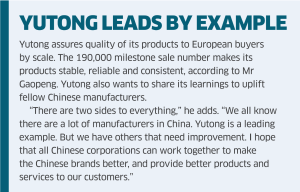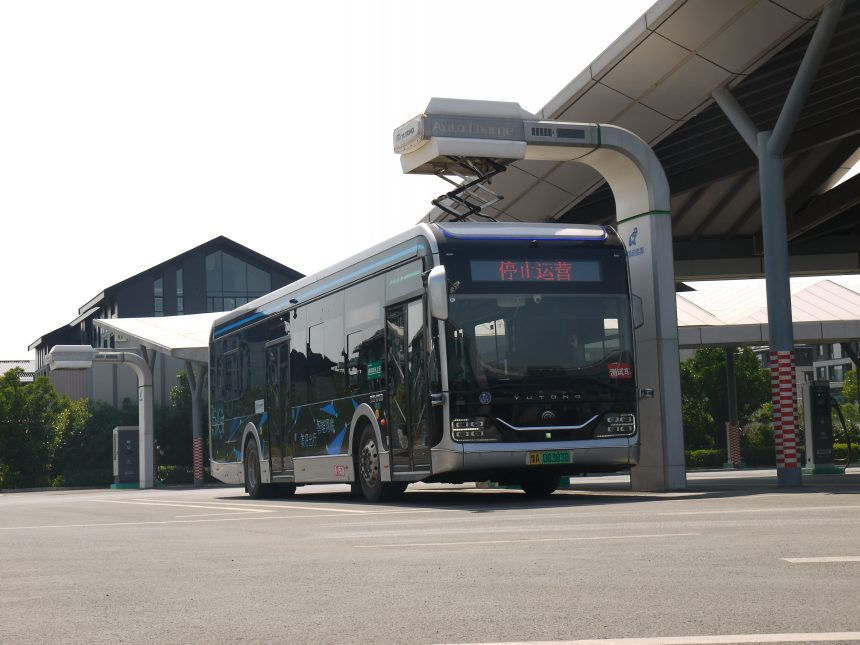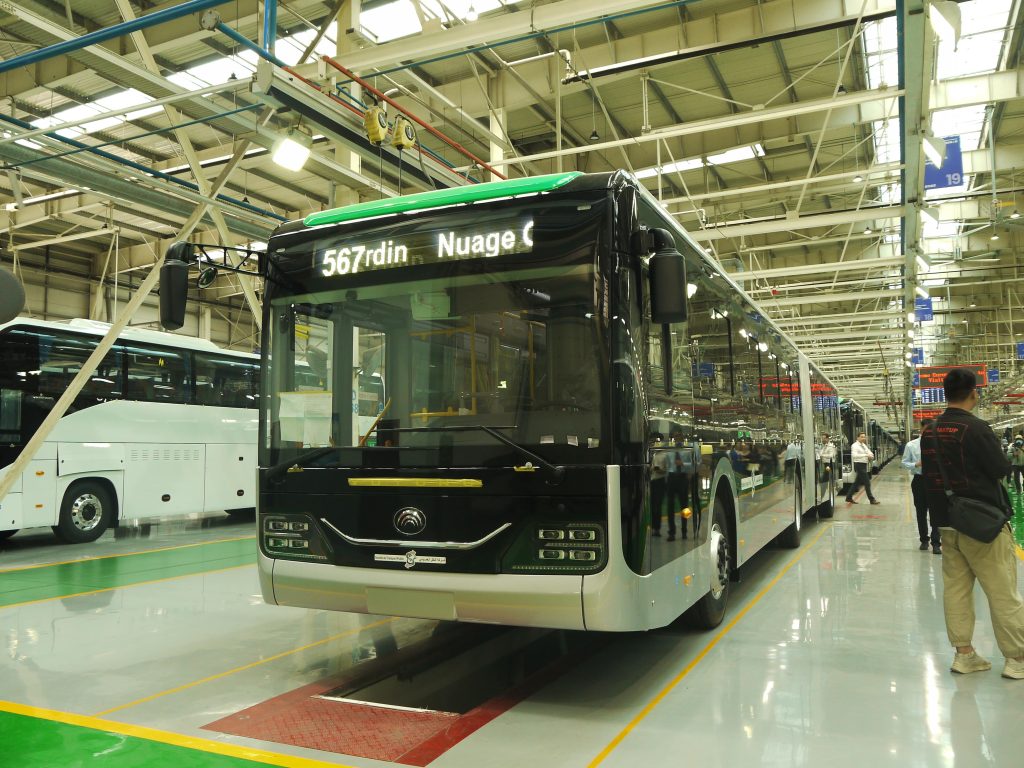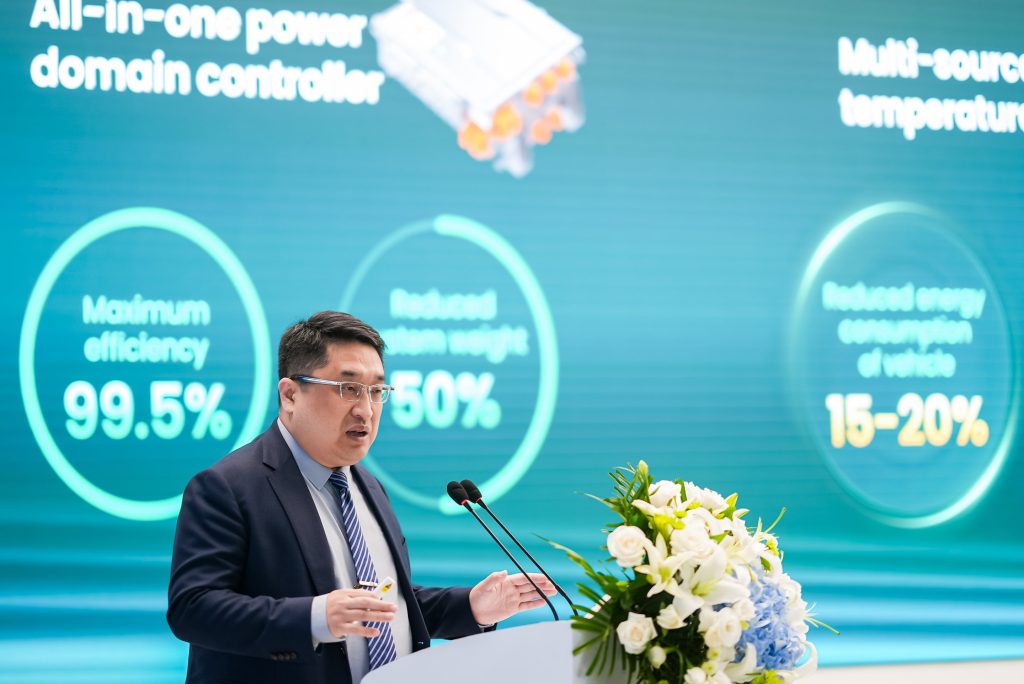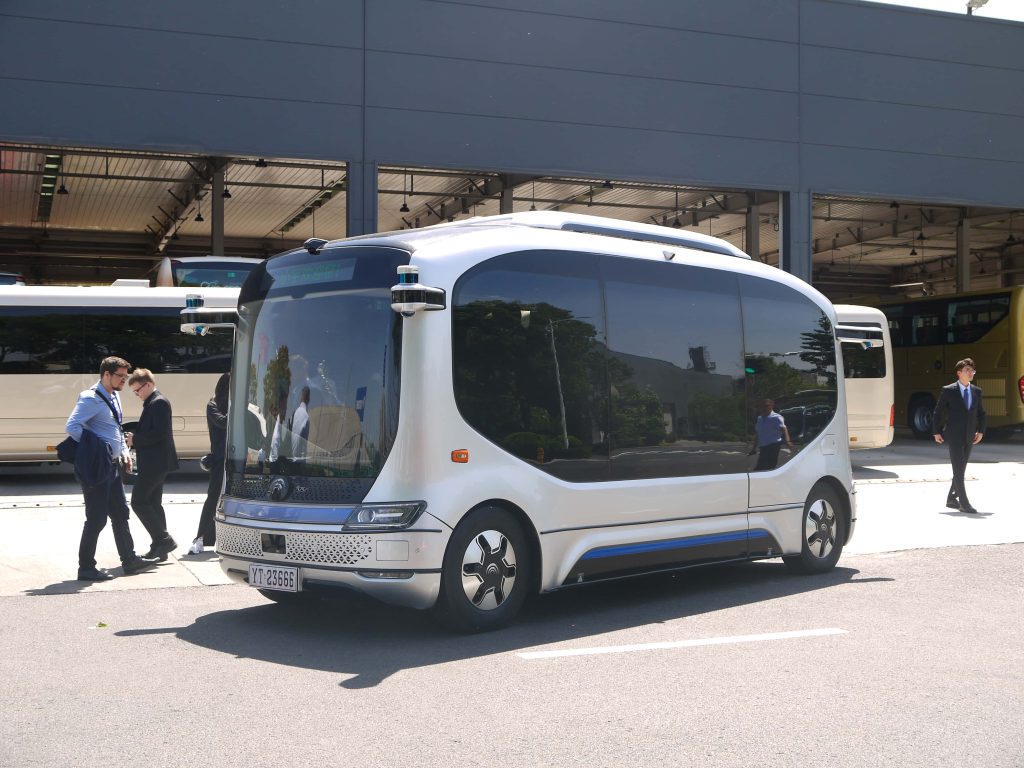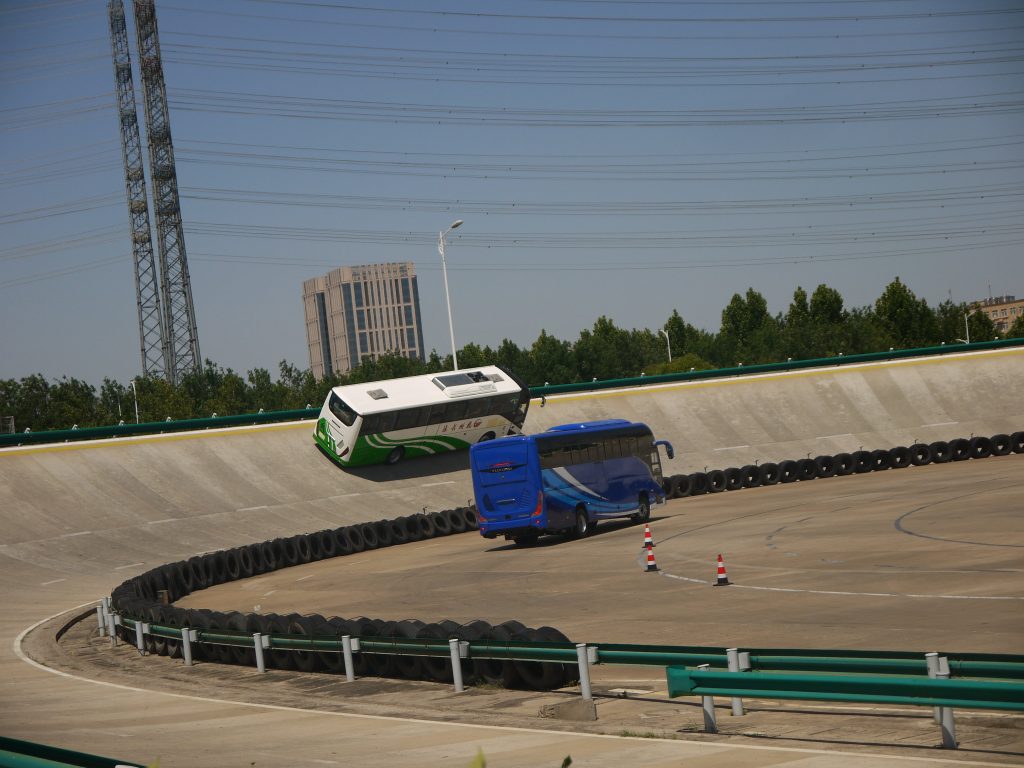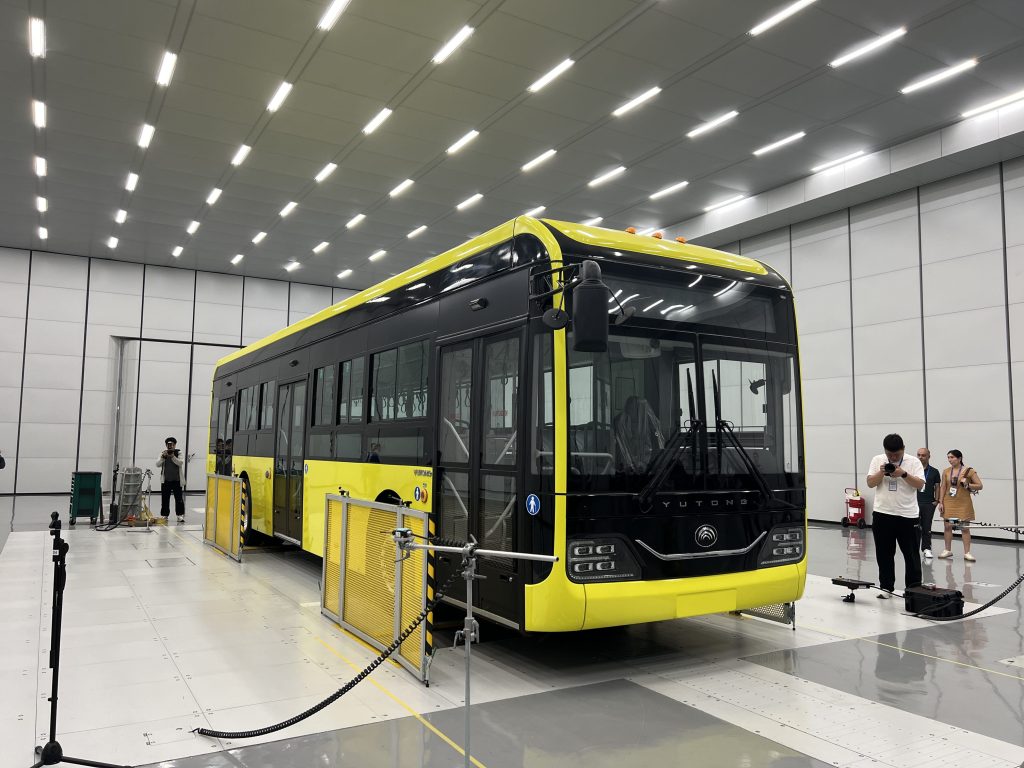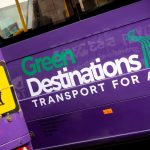European media were invited to visit Yutong Park and the Yutong New Energy Plant in Zhengzhou, China, on 15-16 May, for a tour of the manufacturer’s engineering technology research centre and its advances with autonomy and new energy vehicles (NEVs).
The visit is the first of its kind for Yutong and is an effort to dispel some of the myths and mysteries about Chinese manufacturers to trade press and YouTubers from across Europe. routeone was invited, and here we take the opportunity to share some of what we learned from the experience.
Scale is Yutong’s strength
Sheer scale is impressed upon the visitor when being conveyed across the industrial complex by the manufacturer’s Level 4 autonomous Xiayu buses which, since their debut in 2019, are now operating in 16 cities across China, where they have racked up two million kilometres in similar controlled environments. That scale is Yutong’s strength; it has allowed it to achieve world firsts in sector-specific research and development, while manufacturing coaches and buses on a scale not typically seen anywhere else.
In 2023, the manufacturer’s sales of new energy commercial vehicles topped 190,000 units. That accounts for over 28% of domestic market share and 10% of global market share. In the same year, it delivered a total of 36,518 coaches and buses, and is now close to hitting the milestone of 100,000 coaches and buses exported. Coach remains one of the most comprehensive products in the Yutong business and represents one of its clearest technical strengths.
The world’s largest bus factory?
From this growth, each year Yutong invests 5% of its revenue into development of “state-of-the-art bus technologies”. The European delegation was given a close-up look at some of the fruits of that investment, which includes an industry first China National Accreditation Service for Conformity Assessment (CNAS) lab, a post-doctoral workstation, and the National Engineering Technology Research Center for Electric Bus Control and Safety. Yutong’s research and development team now comprises some 3,000 staff.
Completed in 2012, the Yutong New Energy Plant in Zhengzhou is touted as the largest new energy bus factory in the world. It is one of five manufacturing bases Yutong operates in China, which when combined have a production output of over 150,000 vehicles. The technology centre represents an investment of over one billion RMB. It hosts a manufacturing floor space of some 600,000m2 and an annual production capacity of 30,000 NEVs as its production base. Both NEV and traditional energy vehicles are manufactured on a total of 15 moving production lines at two bus manufacturing facilities with a daily production capacity of 445 units.
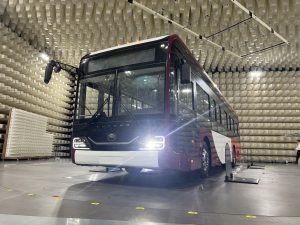
As well as demonstrating the scale of its manufacturing and research capability, Yutong is also keen to demonstrate the robustness of its products. The delegation was given a chance to observe vehicles within the manufacturer’s in-house testing grounds, where they undertake reliability, ride comfort, steering and safety tests on a high-speed loop, electronic stability programme testing ground, climbing road, wading pool and shower chamber.
Experiments were also conducted on the battery technology to prove its strength; a bus performance experiment subjected a coach to a -30°C extreme cold environment, while individual batteries underwent a series of abuse tests including a fast-spreading 900°C blaze, a two-metre underwater test, cell penetration test and an experiment demonstrating the fire abatement effects of a nitrogen protection system.
Other sections of the site include a vibration and noise lab that conducts tests for sound absorption and insulation, a semi-anechoic chamber that analyses and seeks to minimise tyre, axle and drivetrain noise on the interior, while an on-site EMC lab solves the electromagnetic compatibility of vehicles to reduce electromagnetic radiation and interference.
Call for transparent discussions
The experience of witnessing so much technological research and development in one location, undertaken by a single manufacturer, is not easily forgotten, and in a session hosted by CEO of Yutong Bus Europe, Jack Li, the delegation was given the opportunity to discuss in further detail Yutong’s products and new energy ambitions with Gaopeng Li, President of Yutong Sustainable Bus Technology Academy.
It was an interesting time for Yutong to host a European media tour. The visit coincided with the European Commission probe into Chinese subsidies for electric vehicles, with strong hints at further tariffs from Brussels, and this topic was naturally of interest to many of the trade press. Whether a coincidence or not, Yutong has made it clear that one
purpose of this inaugural tour was to open the dialogue with European journalists into the Chinese manufacturing process.
“As a Chinese saying goes, we believe more communication will bring mutual trust,” says Mr Gaopeng. “By inviting European media to Yutong, we believe we can gain a better understanding of each other and bring clearer, more transparent information to our target customers in the market.
“It’s great that we can have authentic discussions on anti-subsidy issues. We would also like to take this opportunity to let our European friends know what Yutong is, and of our product, culture and technologies. This is a great opportunity for European customers to see an authentic Yutong, and to bring transparent information to European governments and operators that will help us better understand each other.”
Future of Yutong is intelligence
The future landscape of Yutong vehicles is undoubtedly hydrogen and battery electric vehicles. Smarter buses, cloud-based platforms and smart services will “come to cover all aspects”, according to Mr Gaopeng, while autonomous developments will enhance fleet maintenance (in addition to the Xiayu, the delegation witnessed the U12’s single-decker’s autonomous capabilities when parking and charging).
Does this mean diesel will soon be phased out? Hints are there, but for now, Yutong has no firm plans to stop diesel manufacture, even for the UK market. There are zero-emission plans for all product lines, with battery-electric vehicles and hydrogen fuel cell-electric already the default choices for Yutong city buses. For heavy duty trucks there are fuel cell, battery charging and battery swap options. But diesel will be “continuously improved” in accordance with UK regulations.
“In general, we apply different options for different products to find what is the most suitable,” says Mr Gaopeng. “For internal combustion engines (ICEs), we have been focused on development of a hydrogen ICE. We base development of our technology on providing suitable options for customers and to lower costs. We want our customers to not only achieve zero-emissions, but at a lower cost too.”
China has initiated a Peak Carbon goal in 2030 and a carbon neutrality goal for 2060. Mr Gaopeng notes that, after 2030, the focus for Yutong will be a combination of fuel cell and hydrogen ICE. “Yutong as a corporation will follow closely the road map to zero carbon emissions as well as China’s policies and other global targets. That includes European ambitions to achieve net zero emissions.”
The focus on hydrogen raises a question for the UK market. Yutong is now onto its third generation of fuel cell, and there have been 1,000 units sold in China, but there has yet to be an announcement of such technology reaching our shores. There are tentative ambitions by Yutong to bring hydrogen to Europe in the future, but Mr Gaopeng notes that the technology for now is still in its infancy, so a cautious approach is being taken.
A spokesperson for Yutong goes on to add: “In promoting hydrogen fuel in Europe, factors such as local hydrogen supply, refuelling infrastructure and operating costs need to be considered, along with the specific market development conditions of the local area.”
Ian Downie, Head of Yutong UK at Pelican Bus and Coach, adds too that the current scarcity of hydrogen, alongside issues with refuelling systems, further inhibits a successful launch of hydrogen models.
Other developments
For a manufacturer with such a comprehensive zero-emission solution as Yutong, there are always conversations to be had on where the trends are in future technology.
The topic of solid-state batteries is one such conversation, and Yutong acknowledges that such batteries are considered “the ultimate development goal” for the industry. While they would resolve safety issues with existing technology such as combustible liquids, there are currently no clear solutions for issues such as lithium-ion transport at solid-state interfaces, and lithium dendrite problems at the anode in solid-state batteries.
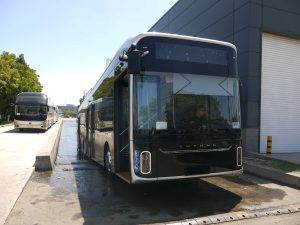
Focus for now, then, is on maximising energy density and long lifespan within the current battery range. Yutong has developed a new generation of high-energy-density lithium iron phosphate batteries that it says achieve an energy density of up to 175Wh/kg. This represents a weight reduction of about 6% compared to the previous generation for the same energy capacity. These batteries are planned to be promoted across various models after Q4 2025.
The current warranted lifespan of power batteries is generally eight years, or 800,000 kilometres. Additionally, Yutong is developing a 15 year, 1.5-million-kilometre long-life battery in the commercial vehicle sector, expected to be ready for installation after Q4 of 2025.
Weight reduction is another significant trend, and Yutong plans to capitalise on this with a new generation of lightweight e-axle, anticipated for release at the end of this year. Integrated diecasting is also being used in the manufacturing process to reduce vehicle weight, enhance fuel efficiency and range, and decrease emissions.
Fast charging has also long been a focus of Yutong’s technology development. Nearly all Yutong commercial vehicles are equipped with DC charging, meaning within one hour it can be charged to 100% even with a capacity of 400kWh or more. Mr Gaopeng says Yutong is striving to shorten the charging speed to 30 to 40 minutes through the development of new charging facilities.
